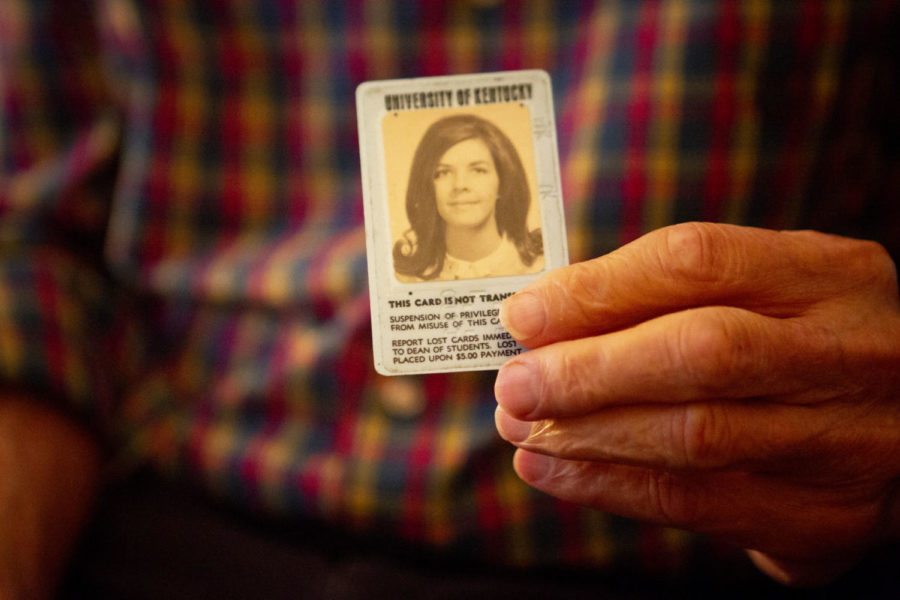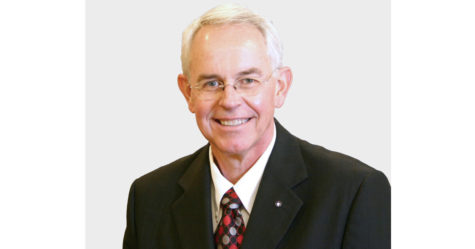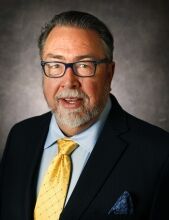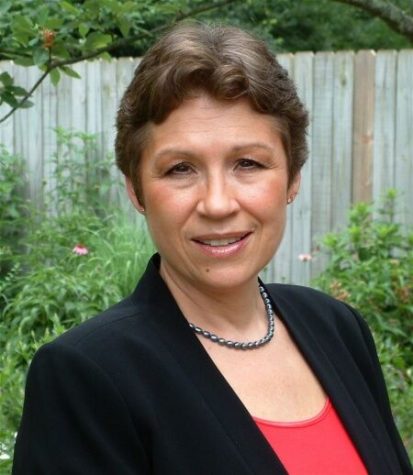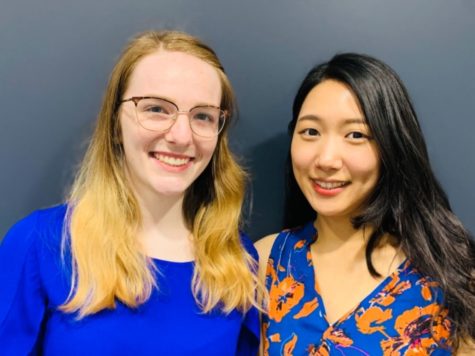‘Addicted to learning’: Donovan Fellows at UK make education a lifestyle
January 14, 2019
For UK Donovan Fellows Neal and Sue Mize, their lifestyle of education all started with an “old man in a white beard.”
That’s the way Sue remembers the first Donovan Fellow she ever saw during her undergraduate years at UK in the 1960s: “He had a long beard and he carried a briefcase. And we thought he was full of crazy. I later found out he was a little crazy. He would get kicked out of classes and then he would come back, and they’d let him back in. That’s when it first started. And he was the only one I knew.”
That memory stuck with her throughout her life, and after two rewarding careers and traveling around the world, it was that memory that coaxed Neal and Sue back to Lexington, where they wed in 1977, to join the Donovan program.
The program allows any person over the age of 65 to study free of charge. Its implementation at UK began in the 1950s with former UK president Dr. Herman L. Donovan, who became inspired to advocate for higher education for people during their retirement.
According to Diana Lockridge, who works with the Donovan Program in the Office of Lifelong Learning, the Board of Trustees approved the Herman L. Donovan Fellowship for Senior Citizens in 1964, on the recommendation of then UK President John Oswald.
In the fall of 1964, 26 Donovan Fellows, ranging in age from 65 to 84, joined traditional UK students on campus for the first time. In 1967, Amanda Hicks became the first Donovan Fellow to receive a degree. In 1975, Alfred D.G. Arthurs became the first to earn a Ph.D.
The program gained national attention in 1966 in a TIME magazine article. The national publicity resulted in inquiries from across the nation and many foreign countries.
In 1976, the Kentucky General Assembly expanded UK’s program by mandating that residents of the Commonwealth, aged 65 or older, receive a tuition waiver for academic classes at all state-supported institutions of higher learning.
Donovan, who believed that “education is a life process” saluted Donovan fellows: “You built so much of our great America: our traditions, our culture, our factories, and our businesses. Our professions are the product of the labors of your life. These years of leisure can and should be years of intellectual growth and development— years when men and women can be upon the errands of the mind. Retirement can be the happiest years of one’s life.”
Now, approximately 100 Donovan Fellows take classes on UK’s campus every fall and spring semester.
Lockridge said she enjoys working with the program and fostering a love of learning.
“It’s an honor to follow in their footsteps,” she said of the people who started the program.
Neal and Sue were interested in the program for a while, especially after reading an AARP article that encouraged people to retire in college towns and finding out Lexington made the Top 10 places to retire list. The Olympic-sized pool on campus was further incentive for Neal, who loves to swim. They made the move in 2011.
The couple loves movies and lectures and they enjoy attending Grand Night For Singing on campus each year, which Neal said was “better than Broadway.” They also attend regular lectures in the Singletary Center.
“I thought ‘it’s gonna be a bunch of dusty old professors with notes that are yellow from reading the same ones for 30 years,’” Sue said of her expectations when returning to join the program. “And it’s not at all like that.”
Rather, she has used the opportunity to explore her interests, expand upon her background in psychotherapy and even present an independent research project in Paris, France, on Ernest Hemingway’s “The Sun Also Rises,” entitled “A psychotherapist’s take on Jake Barnes,” which she described as a nerve wracking but rewarding experience.
“I know there’s five thousand articles on ‘The Sun Also Rises’ and I’ve got something different,” she said.
As a result of her successful presentation in Paris, she will be on a panel in Lansing, Michigan, in May to further discuss Hemingway through the lens of psychotherapy.
Both fellows have 4.0 grade point averages and nearly 100 credit hours. They agree that their addiction for learning, which they both credit to their NT personalities, combined with the ongoing competition they share over their prestigious grades, is what helps keep them going and helps them balance their other responsibilities with their classes.
Sue, a first-generation high school graduate, had to overcome sexist cultural expectations to be where she is today. During the 1950s, while in high school, she said “it wasn’t cool… to be smart or to care about learning.” Women were expected rather to marry when they graduated high school, get pregnant and be housewives.
“That wasn’t for me,” she said.
She said women had limited options during her younger years: They could be a nurse, a teacher or a secretary. She chose teaching because she felt it was the “least of the evils,” but she said her educational journey distinguished her as a rebel early on, partly thanks to an anthropology class she took in which the teacher opened her eyes to the concept that culture was man-made.
After being taught that culture was man-made in a time when the word “culture” typically meant “you went to the opera and you read books,” Sue began to rebel against culture’s expectations of her.
“If culture’s man-made that means I can make up my own,” she said while reflecting back to her thought process at the time. “And that’s what I started doing. I don’t have to believe this stuff about ‘women’s place’ and what they can do and not do. So I was a real rebellious kind of person and I loved to do things to shock people when I was younger because I didn’t have to follow that script of how a woman’s supposed to think or behave. So, I didn’t. That was helpful to me in a lot of ways to get me things that I could never have gotten if I wasn’t willing to go after something that wasn’t ‘for women.’”
It was this independence that brought the two together, when Neal was 33 and Sue was 32.
“It’s like the joke: That I met a Kentucky woman who read a book that didn’t have pictures in it,” Neal said. “And that’s one of the things that attracted me to Sue when I met her was that she was independent and intelligent.”
Being atypical himself, he said he was attracted to the fact that Sue wasn’t dependent and just interested in making him dinner.
“We actually have an intellectual life too, amongst ourselves,” he, a self-proclaimed introvert, said of his extroverted wife. “We’re kind of kindred spirits in that regard.”
Neal’s journey to an educational lifestyle looks different from Sue’s. After high school, he spent several years in the east for the navy during the Vietnam War. When he returned at age 22, he went to school on the Vietnam-era GI Bill, a military program that provided servicemen and women with financial assistance for school.
He said being older helped him be a more dedicated and focused student, and he made the Dean’s List several times. His background being raised in the south inspired his love of history, and ultimately helped him major in history for his undergraduate degree from Georgia Southern University.
“The south is all about the history and the past,” he said.
His grandmother, who was born in 1880 and whose father fought in the Battle of Chattanooga during the Civil War, taught him about the Civil War during his childhood and helped foster his love of history.
As he grew older, he studied history and then got his master’s degree in anthropology. He adopted the philosophy that “history is the master science,” pointing out that medicine, psychology and geology all rely on a history component to work: Geology is the history of the earth, psychology of the mind and medicine of the body.
He now majors in philosophy in the Donovan program, but has also taken various geology classes. Despite the diversity of his studies throughout the years, Neal believes he has truly been a history major his whole life.
While typical college students are at the beginning of their lives, Neal said that for him, with a life of experience behind him, each class he takes in the program is helping him create a bigger picture of himself and where he fits into “history and time.”
“It’s just fascinating to get this old and be this well informed,” he said. “It’s like being in a room. There’s a bunch of cubicles. It’s all of history and all of time. And you hear something and you just fit it into that cubicle.”
Sue, who picked English as her major for the Donovan program, and Neal both agreed that their experience as Donovan Fellows is much more comprehensive than their undergraduate experience.
Sue described the undergraduate version of herself as “pathetic.”
“My first year was horrible,” she said. “Oh my god, I was so unprepared.”
She said she didn’t know who she was yet or what she wanted to study, “so I majored in PE so I could meet football players. Isn’t that horrendous?”
She said now, as a Donovan Fellow, her learning experience is much better.
“After you’re old and you’ve had a lot of experience, the books you read, the literature, the classes you take, you can relate so much more than I could when I was 18, 19,” she said. “By the time I got to graduate school I knew I loved learning and so I was making good grades.”
Neal, who was older during his undergraduate years, didn’t struggle as much because he had already established that he loved history and he knew his strengths included reading and comprehension.
“I was dedicated to getting a degree,” he said.
His dedication to learning has lived on, and he described his average day as being “information driven.” From 5 a.m. to 10 p.m., he focuses his time on managing their retirement through watching the stock market, studying and allotting time to the gym.
As for Sue, who is the president of the Transylvania Park Association where she and Neal live, balances many other social engagements and said it’s important to her to make sure school and classes come first. In the fall semester, she completed an entire essay on John Steinbeck’s “The Grapes of Wrath” with only one hand after breaking her arm. Despite the pain, she pushed through.
“I think it does something for me, certainly mentally, but physically as well,” she said.
Neal and Sue both agreed that young undergraduates today can maximize their education by being adventurous, by being true to who they are but also by exploring who they might be.
Neal’s biggest advice to younger students was to fight the urge to think of college just as a place to get a vocational degree.
“Branch out a little bit and realize you might have interests somewhere else,” he said.
Sue wants younger students to be true to themselves.
“You don’t [know who you are] when you’re this young because there’s so much more to you than you know right now,” she said. “You have more talent. You’ll have more interests. So at the same time you’re following what you love, try stuff that you think that you might not like.”
Both agreed: “You get addicted, and it’s just fun.”









































































































































